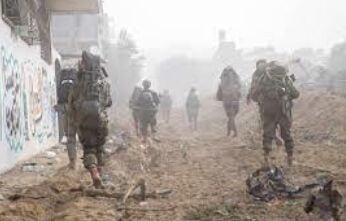Middle East Leaders Refuse Troops and International Forces in Gaza; Highlight Urgent Need for Lasting Solution
Middle East leaders gather in Qatar to discuss the aftermath of the Gaza war, opposing the deployment of troops or international forces in the devastated territory. Efforts are being made to establish a new truce amidst ongoing violence and a humanitarian crisis.
Middle East leaders gathered in Qatar to discuss the aftermath of the Gaza war, but they remained opposed to sending their own troops or international forces into the devastated territory. At the annual Doha Forum, Qatar's Prime Minister Sheikh Mohammed bin Abdulrahman Al Thani emphasized that no Arab country would accept putting boots on the ground in Gaza. He also opposed the idea of an international force in Gaza, stating that Palestinians should not be treated as if they need guardians. The Palestinian Authority, representing Palestinians in the West Bank, acknowledged that Hamas is an integral part of the Palestinian political landscape.
Despite their rivalry, Palestinian Authority Prime Minister Mohammad Shtayyeh stated that Hamas could not be eradicated as they are crucial to the Palestinian political mosaic. The war between Israel and Hamas has sparked protests in several Arab countries, highlighting the delicate nature of the Palestinian question for leaders in the region. Israel's offensive is seen as retaliation for Hamas's attack on October 7, which resulted in significant casualties.
The Israeli Prime Minister Benjamin Netanyahu expressed disagreement with US President Joe Biden over the day after Hamas, but vowed not to repeat the mistakes of past peace accords. Jordan's Prime Minister Bisher Khasawneh warned that failure to address the aftermath of the war could lead to even more devastating consequences in the future. The conflict has also emboldened groups linked to Iran, leading to attacks on US and allied forces in Iraq and Syria. Yemen's Huthis have fired missiles, and Israel is engaged in frequent clashes with Hezbollah in Lebanon.
The Israel-Palestinian question is seen as the heart of all conflicts in the region, with its ramifications extending beyond Lebanon and Yemen. The Qatari Prime Minister Sheikh Mohammed expressed concern about the impact of the war on an entire generation that could be radicalized by the ongoing violence. While concrete policies were lacking at the Doha Forum, Qatar, which hosts the Hamas leadership, is working on establishing a new truce similar to the one that was agreed upon last month. However, the relentless bombardment by Israel is narrowing the window for a ceasefire.
The head of the UN agency for Palestinian refugees, Philippe Lazzarini, who visited Gaza, described the situation as a hell on earth for civilians. He highlighted the urgent need for safety and an end to the ongoing suffering. The UN agency is facing an impossible situation in providing aid and support to the affected population. Overall, the Doha Forum shed light on the sensitivity and complexity of addressing the aftermath of the Gaza war. Leaders in the region expressed opposition to sending troops or international forces to Gaza, emphasizing the importance of finding a lasting solution that respects the rights and aspirations of Palestinians. Efforts are being made to establish a new truce, but the ongoing violence and humanitarian crisis exacerbate the challenges in finding a resolution.




